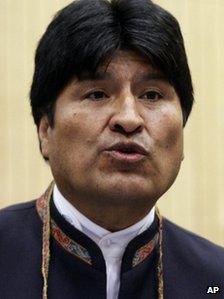Bolivia's Evo Morales urges end to ban on coca chewing
- Published

President Morales stressed what he called the beneficial uses of coca
Bolivian President Evo Morales has urged the UN to correct a "historic wrong" and lift a long-standing ban on the chewing of coca leaves.
Mr Morales, addressing a UN anti-drugs meeting in Vienna, said coca was part of his country's heritage.
Coca leaves, the raw ingredient for cocaine, were declared an illegal substance under a 1961 UN convention.
Mr Morales has long called for coca to be seen as a plant of great medicinal, cultural and religious value.
Addressing the Commission on Narcotic Drugs at the UN Office on Drugs and Crime (UNODC) in Vienna, Mr Morales said there was no data to show that the coca leaf had an adverse effect on human beings.
'Coca marmalade'
The 1961 Single Convention on Narcotic Drugs classified the coca leaf as a banned substance.
It stipulated that coca-chewing be eliminated within 25 years of the convention coming into effect in 1964.
"I call upon you to correct, to repair an error that has gone on for more than 50 years. Because it is only just to recognise legal consumption of coca leaf chewing," Mr Morales said.
Mr Morales stressed that he was not advocating the use of the coca leaf to produce cocaine, but rather to highlight what he called its "beneficial" uses.
"For example, we have coca marmalade here which is very nice. In Bolivia we have coca tea," he said.
Last year, Bolivia withdrew from the UN convention in protest at the classification of coca as an illegal drug.
The Bolivian authorities have since expressed the desire to re-accede provided coca leaf chewing in Bolivia is recognised.
Bolivia is the world's third biggest producer of cocaine, after Colombia and Peru.
Coca has been used in the Andes for thousands of years as a mild stimulant and sacred herbal medicine.
- Published21 January 2012
- Published10 October 2011
- Published21 January 2011
- Published10 March 2011